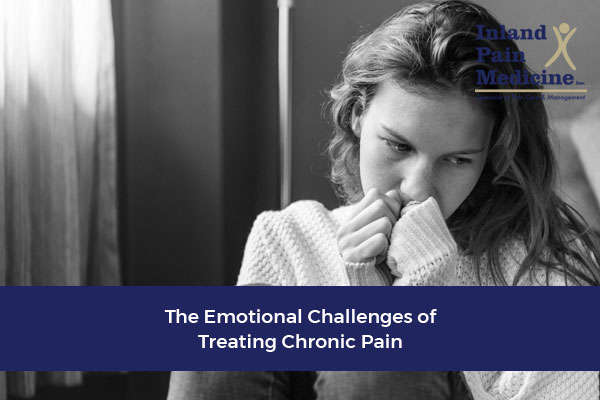
In the previous post, we touched on ways to alleviate the negative psychological effects of chronic pain. Here, we’ll take a closer look at the connections between chronic pain and depression, and strategies for tackling both.
Chronic Pain and the Human Mind
It’s not surprising that many chronic pain warriors also face mental health challenges, particularly depression and anxiety. As we noted before, it can be difficult to stay positive when coping with long term pain.
Chronic pain can affect every aspect of life, making it difficult to work, spend time with family and friends, or pursue hobbies. Even with the most effective treatments, many patients have to make significant (and often unexpected) changes to their routines, relationships, and long term plans in order to accommodate health issues that likely have no permanent cure.
The American Psychological Association also states that, aside from its effects on daily life, pain itself has “biological, psychological and emotional factors,” all of which must be identified and treated.
In addition, being in a constant state of pain from a physical ailment can, over time, affect the way the brain interprets pain, creating more overall sensitivity and, you guessed it, more overall pain.
Chronic Pain and Depression
Chronic pain and depression are closely linked and can become so intermingled that it is difficult to tell where one stops and the other begins.
Not only does chronic pain cause depression, but under-treated depression can also lead to chronic pain. In fact, “persistent physical symptoms that do not respond to treatment, such as headaches…and pain for which no other cause can be diagnosed,” are cited by the Anxiety and Depression Association of America as indicators of depression.
So regardless of which came first, depression and chronic pain can feed into each other, resulting in a downward cycle of increasing suffering and decreasing quality of life.
Treating Both the Physical and Psychological Effects of Chronic Pain
Fortunately, research indicates that the mind-body connection can work in the patients’ favor as well, particularly when patients take an active role in treatment methods.
Common strategies you may consider include:
- Cognitive Behavioral Therapy to develop more effective coping techniques, set reasonable goals, help you deal with setbacks, and improve your overall outlook on life
- Medications to help adjust mood-regulating chemicals in the body, which can be thrown out of balance by long term health issues
- Meditation and relaxation practices to reduce stress and muscle tension
- “Mindful” forms of exercise that focus on being present in the body during a set of low impact movements (ex. Yoga or Tai Chi)
Seeking treatment for mental health challenges does not mean that a person is weak or overly dramatic. This is particularly true for those handling long term pain disorders.
Chronic pain can affect every system in the body and cause serious upheaval in a patient’s life. Thus, treatments for the mind are no less important than treatments aimed at the body. They are, instead, integral to effective long term chronic pain management. You cannot completely take care of your body without also taking care of your mental and emotional health.
Leave a reply








I suffered from what they called peripheral artery disease (PAD). I have been suffering for years, Me and my wife searched for a medical cure, and then we came across a testimony of a man who suffered the same and was cured by Dr Chief Lucky. So my wife and I contacted Dr Chief Lucky via an email and thank God he replied. I explained what was wrong and he sent me herbal medicines that helped heal me completely. I am happy to say that herbal medicine is the ultimate and Dr Chief Lucky I am grateful. You can contact him on his email: chiefdrlucky@gmail.com or whatsapp: +2348132777335, Dr Chief Lucky said that he also specializes in the following diseases: LUPUS, ALS, CANCER, HPV, HERPES, DIABETES, COPD, HEPATITIS B, HIV AIDS, And more.
Replythanks for info
ReplyI contacted this herbal Doctor. I received this herbal medicine, he gave me instructions on how to use it, after taken the medicine as instructed, i went for check up and the result shows negative and i was cured of this deadly disease within 2 weeks, I am now free from Herpes. You can contact [ [Robinson.buckler@yahoo.com]]…………
-GENITAL AND ORAL HERPES
Reply-HPV
-DIABETES
-ED SOLUTION
– HEPATITIS A,B AND C
-COLD SORE
-LOWER RESPIRATORY INFECTION
-HYPERTENSION
-SHINGLES
-FIBROID
-BARENESS/INFERTILITY..
HOW TO GET BACK MY EX LOVE ☎ +256789510542 CANADA ,UK
Call Psychic Rowan ☎+256789510542 to help you get back your lost love with the best love spell. Powerful Love Spells That Will Make Your Ex-Lover Come Back To You, Bring Back Lost Love In 24 Hours. Psychic Rowan is well known for her magic spell cast. She can solve each and every problem of love through her powerful services.
She has proved herself through her work and has helped many people all around the world through spells that bring back lost love and broken marriages. She solves every problem in the easiest way and gives his 100% and brings out the desired result to satisfy the person who comes to her for help.
If you are searching for a spell caster to solve your marriage problems then you are on the right place. She provides various services like Lost love spell, Love spell, Love spell chants, bring back my wife spell, bring back my husband spell, Voodoo love spell, best Love spell that work, etc. So if you are having any problem and want to solve it through magic spells then do not hesitate to contact Psychic Rowan
Call/WhatsApp: +256789510542
ReplyEmail: info@courtspells.com
Website: http://www.courtspells.com